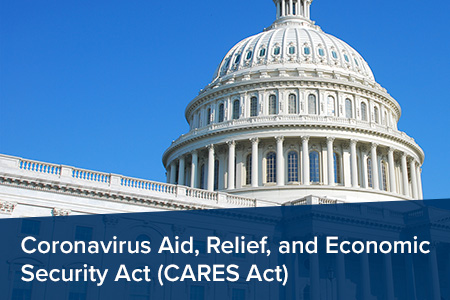With the massive $2 trillion coronavirus stimulus package signed into law, Americans are breathing a collective sigh of relief. While it certainly won’t solve the current economic slowdown, it should provide a huge short-term financial cushion for individuals and businesses alike.

The Coronavirus Aid, Relief and Economic Security (CARES) Act joins a number of other notable economic benefits that have recently become available to working Americans. Each is designed to help soften the financial blow caused by the COVID-19 crisis:
- Employees who are directly affected by the virus will be granted two weeks of paid sick leave. This will help protect their jobs and allow them to rest and recover at home without impacting their paychecks. Unfortunately, those who work for companies that have over 500 employees or fewer than 50 are excluded. The same goes for employees of health care providers.
- The government has extended the deadline to file your 2019 federal tax return by 90 days. Your return, and tax bill if you have one, are now due by July 15th. It’s welcome news for those who need a little more time to get themselves square with the IRS. On a similar note, self-employed folks and businesses both have an additional three months before their first estimated quarterly tax payment comes due.
We are all experiencing these unprecedented times together. No matter what level of wealth you may have, our team at JJ Burns & Company felt it vitally important to provide clarity around the comprehensive details of this legislation. In short, resources are on the way for those in great need. And planning opportunities have uniquely arisen for others to utilize their wealth to help others who need assistance.
Please feel free to pass this along to everyone you may know as we all are beginning to hear great challenges from our family, friends, and loved ones. We provided links below to help you better understand the CARES Act in as much “plain speak” as possible.
Now let’s take a look at what’s in this coronavirus relief package and how it may affect you.
Unemployment Benefits Are Expanding
A whopping 3.3 million American workers recently flooded the system in search of unemployment benefits. For workers who are eligible for state or federal benefits, the CARES Act will result in an additional $600 per week for 12 weeks. For the average worker, these combined benefits will replace 100% of lost wages, according to the House Committee on Ways & Means. On top of that, workers who were previously ineligible for unemployment benefits, like freelancers, will now enjoy coverage.
States that have “work sharing” programs in place will also help those who are now underemployed because of the coronavirus. In these states, employers help prevent layoffs by voluntarily teaming up with their state’s unemployment office. The employer reduces employee hours—and these workers are then eligible for partial state unemployment benefits. States ordinarily cover the full cost of such arrangements, but because of the CARES Act, they’ll receive $100 million to help promote the program and enroll new employers, among other aims.
Many Americans Will Receive a Coronavirus Relief Check
For many families, the CARES Act will free up short-term funds that should become available within a matter of weeks. This translates to a $1,200 check for those who earn less than $75,000. Married couples who file jointly will receive $2,400 if their earnings don’t exceed $150,000. Parents can also expect an extra $500 for each dependent child.
The amount gradually starts phasing out for individuals who earn $75,000. Those who earn $99,000+ will be ineligible for the benefit. The income threshold will be determined based on your 2019 tax return, or 2018 if that’s the most recent return filed.
One other form of relief is on its way for people who have federal student loans—payments can now be deferred through September 30, 2020. Interest will not accrue on the debt during this time, and involuntary collection of student loans will be stopped as well.
Distributions from Your Retirement Accounts Will Be Treated Differently
Required Minimum Distributions (RMDs), which you normally must begin taking from your tax-advantaged retirement accounts at age 72 (or 70 ½ if you reach 70 ½ before January 1, 2020) are being put on hold for 2020. This, in turn, should help ease the tax burden for many.
During this time of hardship, some families are also having to dip into their retirement accounts to bridge the income gap. While doing this prior to age 59½ would normally result in a 10% penalty, the CARES Act is waiving this fee. You can now take distributions of up to $100,000 from your retirement accounts. In addition, folks in this boat will also have three years to cover the tax bill, along with the ability to recontribute these funds to the same accounts at a later point.
There’s a New Tax Deduction for Charitable Donations
For the 2020 tax year, up to $300 in qualified charitable donations will be tax deductible—and you can take this deduction whether you itemize or not. This above-the-line deduction incentivizes charitable giving during this difficult time. Here’s a list of charities supporting COVID-19 response, relief, and recovery efforts.
Aid Is on its Way to American Businesses
The CARES Act is unlocking hundreds of billions for businesses, big and small, that have been crippled by the coronavirus. Businesses, non-profits and self-employed folks with fewer than 500 workers can apply for loans in the amount of $10 million or less. Funds can be spent on things like rent, payroll, health care costs and utilities—thanks to the Paycheck Protection Program. The perk is that these loans are forgivable, so long as the business doesn’t lay off employees prior to June 30th.
Small businesses will also be able to defer payroll taxes this year, with 50% being due by December 31, 2021. (The rest must be settled by the end of 2022.) Meanwhile, if a government order has suspended your business, or revenue has dipped below 50% of where it was last year during the same quarter, you can also seek the Employee Retention Credit. It’s worth half of qualified wages and caps out at $10,000 in wages per worker. The CARES Act also sets aside $10 billion in emergency relief grants for businesses having a tough time covering other costs.
Mid-size businesses with between 500 and 10,000 employees can qualify for emergency loans if they retain at least 90% of their workforce until September 30th. They can borrow at an interest rate that is not higher than 2% annually, and don’t have to repay the principal or interest for the first 6 months of the loan.
As for big businesses, the legislation reserves $500 billion worth of loans and other aid. This includes $58 billion to help the airline industry recover. It should be noted that businesses that take advantage of these loans will be held to a high level of accountability. Stock buybacks, for example, are off limits for the duration of the loan, plus one year after. There are also reporting and disclosure requirements.
What It Means for Your Health Care Expenses
If you have an FSA or HSA, over-the-counter medications and menstrual products are now considered qualified medical expenses under the CARES Act. And when the coronavirus vaccine eventually becomes available, Medicare beneficiaries will be eligible to receive it free of charge. Lastly, during the COVID-19 crisis, Medicare Part D recipients can request to have up to 90 days’ worth of medication prescribed and filled.
Our country, and really the whole world, is in a tough spot right now as we navigate this pandemic. But if there’s one thing I know for sure, it’s that we will get through it. The first step is understanding exactly how this new, complex piece of legislation is going to affect you, your family, and your business. At JJ Burns & Company, we’re here to put things in plain English—and help you make a plan for moving forward.
cares act coronavirus stimulus bill




